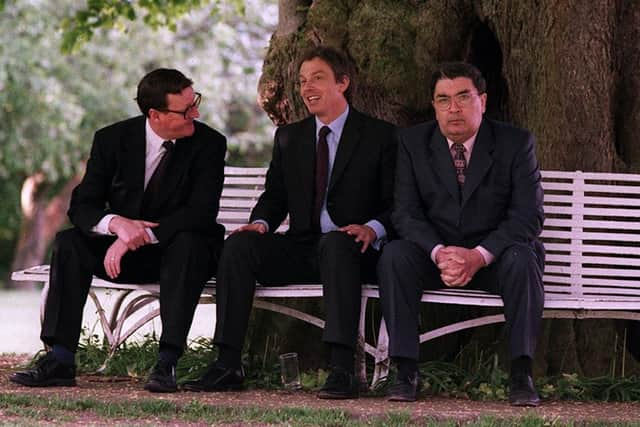Alex Kane: Only the voters can sort out our Executive mess


My younger readers (and there are more of you than you might think) probably won’t have heard of the comedian Tommy Handley. He was a huge star in the 1930s and 40s and his radio programme It’s That Man Again (ITMA) was listened to by 40% of the entire UK population during the WW2 years. No modern programme comes close to those figures.
He told this story in an interview: I was returning from a charity lunch and just managed to avoid a crash when a tree fell across the road as I was driving towards it. One of my friends jumped out, had a look and went in search of a house or phone box. About 15 minutes later there was a queue of cars behind me and the driver of one of them started honking his horn every few seconds. I got fed up, walked down the line, knocked his window and he wound it down. I said, “I tell you what, I’ll get in there and keep banging the horn while you go and move the bloody great tree blocking the road.”
Advertisement
Hide AdAdvertisement
Hide AdI was reminded of that story a few days ago when, at a Zoom event, someone asked me why I kept pointing out the problems rather than offering solutions. It was a good question. I explained I had spent years supporting solutions. In December 1973 (I was 18), when the Sunningdale Agreement was announced, I decided it was worth giving it a chance. I discussed it with my dad and mum and a few friends. There were differences of opinion between us – some quite sharp – but it still seemed to me that the best way of bringing Northern Ireland together was by power-sharing.


Within months, of course, the Sunningdale experiment had collapsed, Faulkner had resigned as leader of the UUP and it took another couple of decades before all of unionism and loyalism had accepted that the price for devolution was power-sharing; although by then Sinn Fein had nudged towards 16% of the vote and the British government had hardened its stance on the ‘no selfish strategic or economic interest’ language on Northern Ireland.
I had huge difficulties with the Good Friday Agreement. There were aspects of it which concerned me, not least the early release of terrorists (of all varieties) and a fear that it might tighten rather than loosen the grip head-count sectarianism had on politics.
But set against those concerns were three others: there was no evidence of anti-agreement unionism having a viable alternative to it; there was no evidence that the government would respond positively to unionism if the agreement was endorsed by a thumping majority of nationalism on both sides of the border; and it had long been a belief of mine that successive British governments were prioritising an agreement into which Sinn Fein/IRA would buy.
Advertisement
Hide AdAdvertisement
Hide AdI’ve never claimed the GFA was an ideal choice for unionism, but it seemed to be the only show in town – and with nothing better in the pipeline. Some of its most ferocious critics, then and now, had apparently forgotten how unsupportive British governments had been of unionism, particularly since the early 1980s. Those who had forgotten may have had occasional flashbacks when they saw how Boris Johnson treated the DUP after he became prime minister.
It’s worth remembering, too, that the anti-agreement unionists elected to the Assembly in 1998 could probably have wrecked it (winning over some of Trimble’s MLAs in the process) had they put their collective minds to it. They didn’t. And it’s also worth remembering (as predicted in this column long before the St Andrews negotiations – and Ian Paisley replied to tell me it was nonsense) that the DUP, rather than walk and wreck once they eclipsed the UUP in the 2003 Assembly election chose, instead, to cut their own ‘ourselves together’ deal with Sinn Fein.
That 2006/7 deal killed off any lingering hopes I had that ‘moderate’ unionism and nationalism might be able to build a stable centre ground and find a new and better way of doing political business together. Crucially, it also forced another realisation upon me: the DUP and Sinn Fein had grown because increasing numbers of voters within unionism and nationalism were rejecting so-called moderation and endorsing a more virulent form of us-and-them politics.
So when people talk to me about solutions to the problems I have highlighted, all I can do is reply that it’s hard to suggest a solution when so many people still prefer to endorse the two parties who seem to benefit most from polarisation and a zero-sum approach to negotiation (each participant’s gain or loss of utility must be exactly balanced by the losses or gains of the utility of the other participant).
Advertisement
Hide AdAdvertisement
Hide AdIf there is a solution to the problems – and, to be honest, I’m not sure a solution is possible against a background of Brexit and non-stop talk from nationalism about a border poll and Irish unity – then it must begin with a majority of voters. Put bluntly, there’s no point complaining about the ongoing failings of the Executive when a majority of voters still support the two parties most responsible for the failings. Change those dynamics and maybe – and it’s only a maybe – solutions will emerge. I won’t hold my breath.